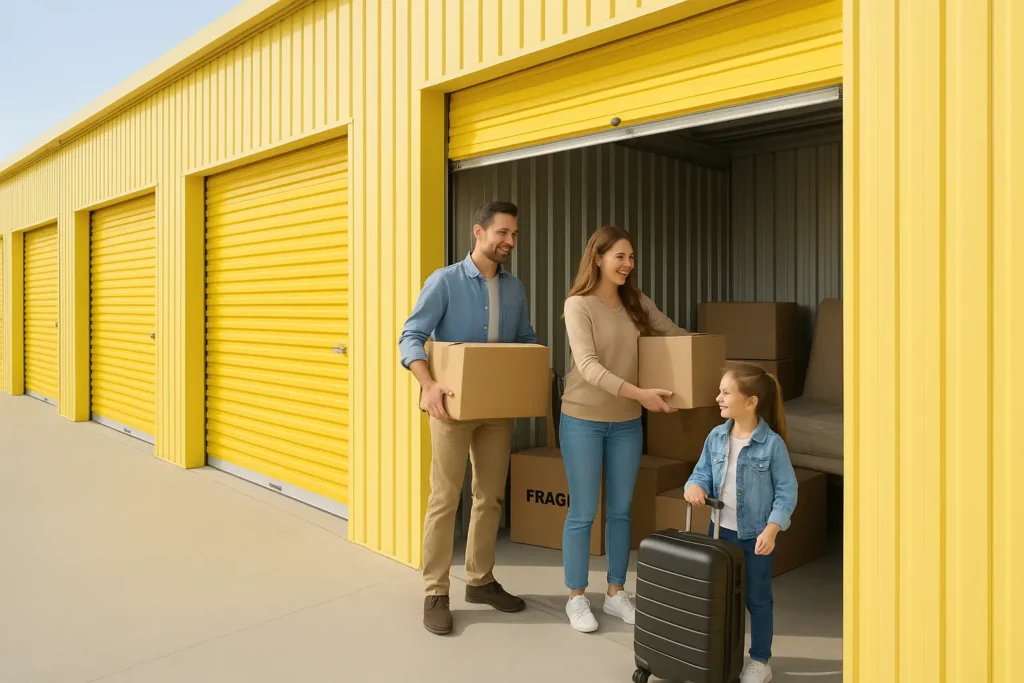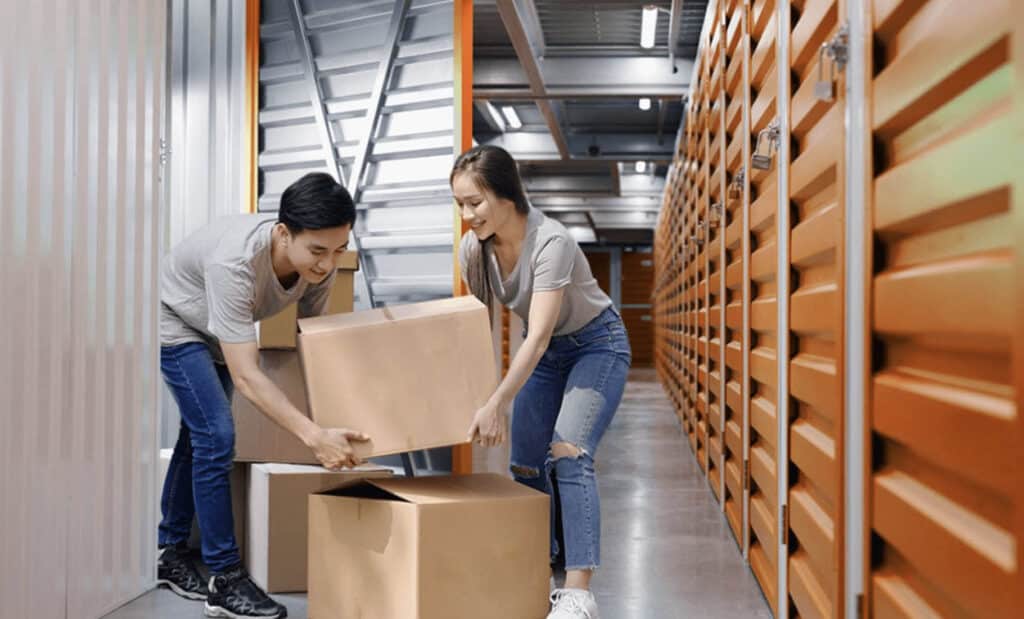When expats plan on moving abroad, they often face the decision of what to do with items they cannot immediately take. Long-term storage in the UAE offers a safe and accessible space to store furniture, documents, luxury items, and surplus belongings during relocation.
- “Long-term storage” means contracts of months to years, not just weeks.
- Facilities are often climate-controlled, secured, and certified for safety.
Most self-storage operators in Dubai, Sharjah, and Abu Dhabi offer units ranging from 25–160 sq ft, suitable for anything from documents to full home contents. Cost examples: a 25 sq ft locker runs about AED 300-400/month, while a 160 sq ft unit can cost AED 3,000+ monthly depending on amenities.
This guide explains how long-term storage in the UAE helps expats moving abroad, supported by real data and expert insights.
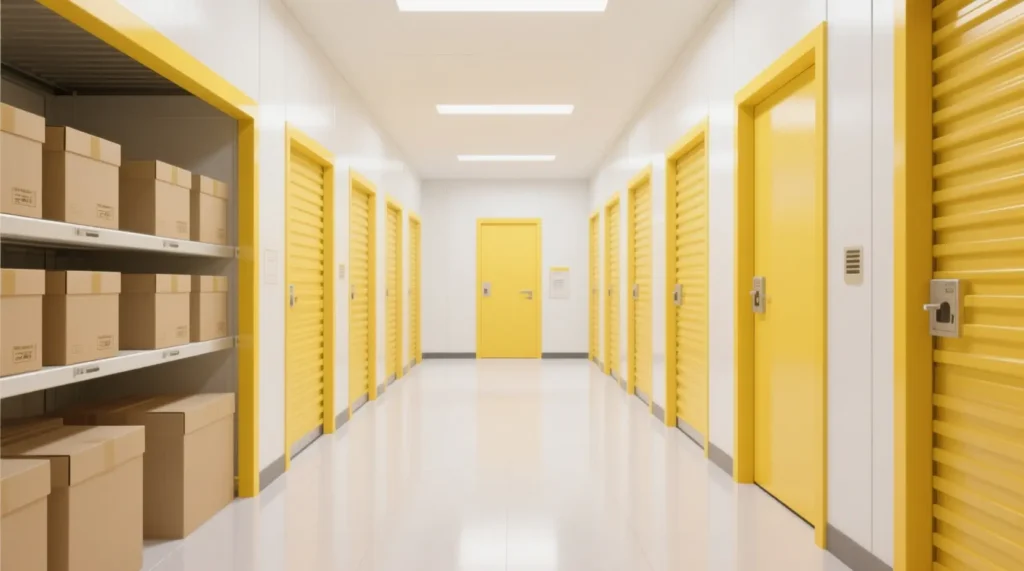
What Is Long-Term Storage in the UAE?
Long-term storage means renting secure facilities for months or years to hold items during relocation.
Typical Features of UAE Storage Units:
- Unit sizes from 25 sq ft lockers to 160+ sq ft rooms.
- Climate control to protect electronics, art, and furniture.
- 24/7 CCTV, biometric access, and fire suppression systems.
- Flexible contracts (monthly, quarterly, annual).
- Insurance packages for high-value items.
Costs range from AED 300/month for small lockers to AED 3,000+/month for large units.
Who Uses Long-Term Storage in the UAE When Moving Abroad?
Families Relocating Abroad
- Store bulky furniture, children’s belongings, and sentimental items.
- Protect heirlooms that children may want later.
Students Studying Overseas
- Over 15,000 UAE students study abroad annually.
- They use long-term storage for books, equipment, and vehicles.
Contract & Seasonal Workers
- Temporary workers often return home, leaving behind belongings that need secure storage.
Digital Nomads & Remote Workers
- With remote work visas, many professionals split time abroad and in UAE.
Long-term storage provides a safe base for possessions.
Why Do People Moving Abroad Need Long-Term Storage in the UAE?
Many expats underestimate how expensive and logistically challenging moving all possessions can be. Long-term storage in the UAE serves as a buffer to avoid financial and practical errors during relocation.
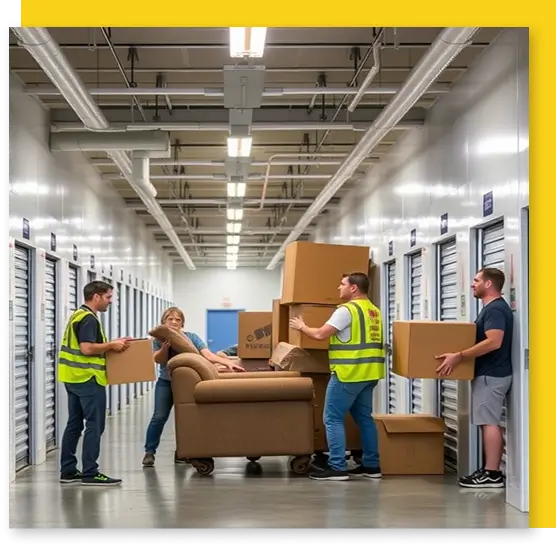
Key Benefits for Expats:
- Prevent rushing to sell items below market value due to tight timeframes.
- Avoid paying excessive international shipping or customs fees.
- Protect valuables until permanent relocation arrangements are finalized.
- Save on shipping costs by sending only essentials abroad.
- Maintain flexibility during visa delays or uncertain job placements.
- Access belongings later when returning to the UAE.
The UAE self-storage market generated USD 602.5 million in revenue in 2024, forecasted to reach USD 859.2 million by 2030, growing at about 6.3% annually, showing that increasing numbers of residents and expats rely on long-term storage solutions.
How Long-Term Storage in the UAE Helps Avoid Relocation Mistakes
Expats moving abroad often underestimate the hidden costs of relocation. Long-term storage in the UAE provides solutions to common mistakes:
- Avoid high shipping costs: International shipping can cost AED 8,000–12,000 for a 20-foot container, while equivalent UAE storage costs AED 7,000–9,000 annually.
- Prevent rushed sales: Expats selling items quickly often lose 30–50% of value.
- Protect against damage: Climate-controlled facilities prevent mold, rust, and pest damage common in UAE’s humid climate.
- Ensure flexibility: Storage allows temporary holding during unexpected job delays.
- Safeguard luxury items: Artwork, antiques, and jewelry are better preserved in insured, climate-regulated units.
Deep Dive: Mistakes Avoided via Storage
| Mistake | What Happens Without Storage | How Storage Helps |
| Overpaying for international shipping | Shipping full containers is expensive; fragile items may get damaged | Store items you don’t need immediately; ship less urgent goods later |
| Selling items cheaply in a hurry | Poor resale value; loss of sentimental or financial value | Keep items safely until you can evaluate the sale or reuse |
| Damage from climate, pests, and humidity | Electronics, wood, and textiles degrade if exposed | Climate-controlled units maintain ideal temperature & humidity (~18-24 °C, 40-60% RH) |
| Poor security or theft | In unsecured homes, items are vulnerable during vacating | Storage facilities in the UAE offer 24/7 CCTV, access control, and fire-suppression systems |
| Unplanned contract rigidity | If you stay longer or return earlier, you may pay penalties or waste space | Flexible contracts allow adjustable durations and unit sizes |
Evidence:
- The UAE self-storage market’s largest and fastest-growing segment is large unit size, suggesting expats choose bigger units rather than minimal storage, driven by the need to protect many possessions.
- High humidity in coastal emirates like Dubai/Sharjah contributes to storage damage risk, with around 59-65% relative humidity in winter. Climate control mitigates that.
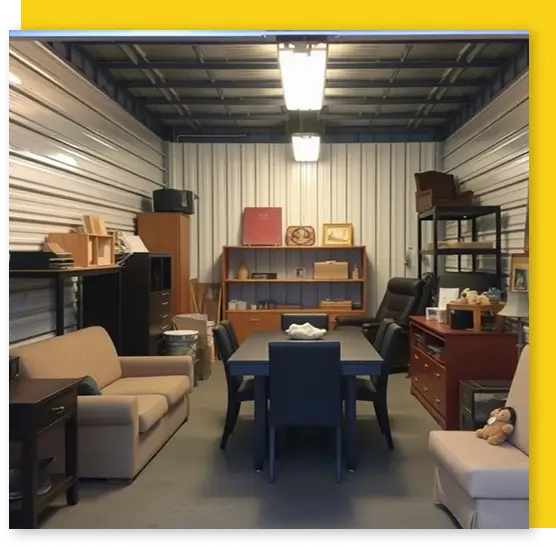
What Security Features Do UAE Storage Facilities Provide?
Expats often worry about loss, damage, or theft when storing valuables abroad or in storage. The right storage facility in the UAE addresses these concerns.
- Common features include 24/7 CCTV, alarms, biometric or PIN-based access, and perimeter fencing.
- Fire detection, suppression systems, and regular inspection: many storage providers comply with UAE fire & life safety regulations.
- Climate control units protect against humidity and temperature fluctuations. In Dubai, for example, humidity averages 40-55%. These conditions damage paper, electronics, and furniture unless mitigated.
Market Behavior:
- In the UAE self-storage market, medium units generate the highest revenue. Large units are the fastest growing, indicating demand by customers for storing bigger, high-value goods.
- Storage providers report that luxury storage offerings are differentiators for premium clients.
How Much Does Long-Term Storage in the UAE Cost?
Costs depend heavily on unit size, location (specifically, which emirate and its level of centralization), amenities such as climate control, and contract duration. Here’s more detailed cost data with real market pricing:
| Unit Size (sq ft) | Typical Use | Cost Range / Month (AED) |
| 25 sq ft (lockers/documents) | Documents, suitcases, boxes | AED 300-400 |
| 50 sq ft | Studio apartment’s contents: furniture + electronics | AED 900-1,400 |
| 75-100 sq ft | 1-2 bedroom home’s items | AED 1,000-2,000 |
| 160 sq ft and above | Family furniture, or business overflow storage | AED 3,000+ |
Additional cost considerations:
- Climate control can add 10-30% extra to the base rent.
- VAT (5%) applies to many services in the UAE. Some facilities include it; others add it separately.
- Location premiums: central Dubai units cost more per sq ft than suburban or Sharjah/Ajman units.
Which Items Should Expats Store When Moving Abroad?
Deciding which items to put into long-term storage in the UAE depends on value, frequency of use, and difficulty of replacement. When preparing to move abroad, expats may need to choose between selling, shipping, or storing items. Prioritizing what to store can minimize cost, maximize convenience, and preserve valuables.
Typical Items for Storage:
- Furniture (sofas, beds, wardrobes) is bulky and costly to ship or discard.
- Seasonal goods (winter wear, sports equipment) are used less frequently.
- Documents and paperwork (contracts, property deeds, certificates) need protection and easy access.
- Electronics (TVs, computers, appliances) are vulnerable to climate damage during transit.
- Luxury items/collectibles (art, antiques, jewelry), high value, sentimental importance.
Surveys show 60% of expats store furniture, 40% store electronics, and 25% store documents when relocating.
Data Insights:
- 50-sq ft units frequently used by expats to store studio apartment contents, including furniture + electronics.
- Many storage providers report that “medium-sized units (≈6-15 m²)” generate the most revenue, indicating frequent usage by people needing to store furniture & household items.
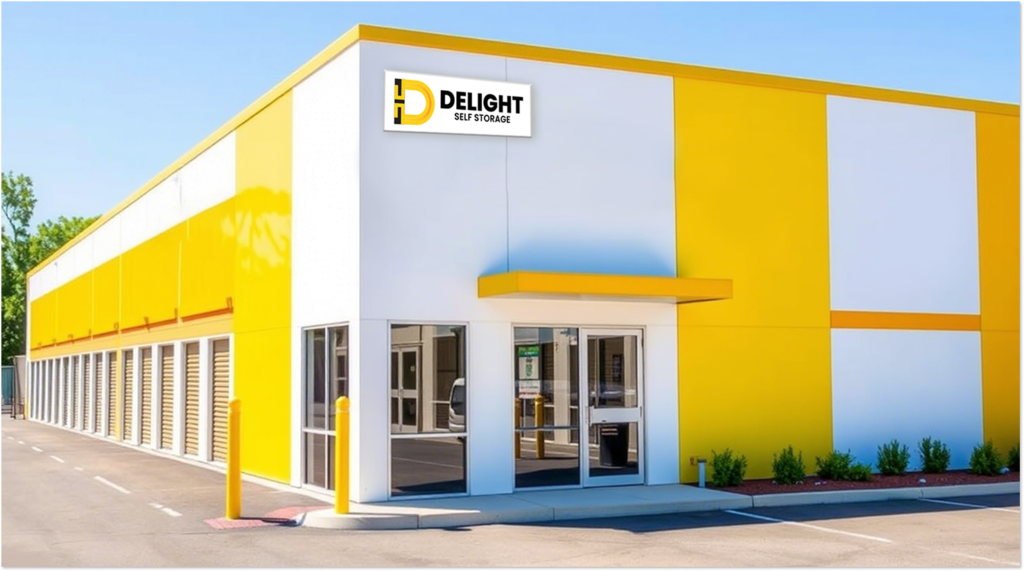
Business/Corporate Relocation & Legal/Insurance Considerations
For expats who are business owners or relocating offices/equipment, the stakes are higher.
Corporate Uses:
- Archiving documents for compliance
- Storing office furniture, hardware
- Keeping trade-show props, spare inventory
Legal / Insurance Needs:
- Documents required: Emirates ID/passport copy, legal address proof, sometimes import/export declarations if items may cross borders.
- Insurance: Many UAE storage facilities offer packages covering fire, theft, and natural damage. Premiums vary.
- VAT & Regulatory Compliance: storage services are subject to UAE VAT (5% typically), consumer protection laws, fire & safety codes.
How Do UAE Storage Facilities Support Luxury and Sensitive Belongings?
Long-term storage in the UAE isn’t just about space but also about preserving items of high value or sensitivity under the right conditions.
- Climate-controlled units maintain stable temperatures (≈18-24 °C) and humidity (≈40-60% RH), protecting wood, leather, and electronics. Facilities cite these specs in service literature.
- Premium storage providers offer extra services: custom crating, padded packaging, anti-dust, and mold prevention. These reduce risk, especially during long absences.
- Security upgrades (fire suppression, flood sensors, biometric/timed access) reduce the chance of catastrophic loss. Expats storing luxury items often prefer facilities with all these features.
Risks of Not Using Long-Term Storage in the UAE
Skipping storage can lead to avoidable losses. Here’s what data and expert commentary show:
- Documents, furniture, or electronics left in the home or apartment during vacating can suffer damage from heat, pests, or incomplete packing. Climate factors in Dubai alone risk mildew, fading, and electronic malfunction without protection.
- Selling everything hastily often results in 30-50% value loss, based on resale market reports. Storage allows time to sell at better prices or repurpose.
- Lack of secure storage can mean theft risk or damage, not just during transit but during downtime while awaiting shipping or visa approvals. Verified providers cite 24/7 surveillance and insurance to counter this risk.
Cultural Angle: Preserving Memories & Identity
Moving abroad often means letting go of more than material items. Storage helps preserve connection, heritage, and emotional stability.
- Heirlooms, personal photographs, and family furniture often carry cultural significance.
- Expats report regret when forced sales discard items of emotional value.
- Storage allows deferred decisions on what to sell, keep, or donate without pressure.
While quantitative studies in UAE specifically are limited, surveys globally indicate that expats want options to preserve non-essentials and memorabilia when moving. This emotional benefit helps avoid psychological mistakes (regret/loss) along with financial ones.
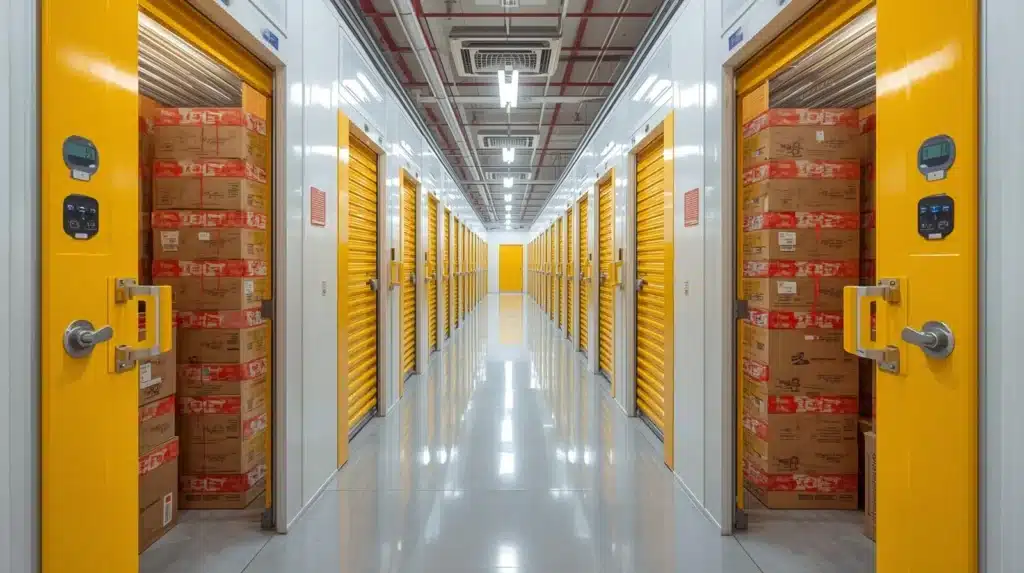
Technology, Flexibility & Future Trends in UAE Storage
The UAE storage market is not static, evolving with tech, sustainability, and client expectations.
Emerging Features and Trends:
- Smart access: biometric entry, online scheduling, digital monitoring.
- Modular unit sizes: ability to scale up / down as storage needs change.
- Sustainability: use of eco-friendly materials, solar panels, and energy-efficient lighting in facilities.
- Personalized service: valet pickup/drop-off, custom packaging, white glove services.
Forecast & Market Growth:
- Market revenue expected to reach USD 859.2 million by 2030 from USD 602.5 million in 2024 at ~6.3% CAGR.
- Storage systems market (for data, but indicative of demand for secure storage in general) projected to be valued at USD 428.7 million by 2028, driven by tech, e-commerce, and a diversified economy.
How to Choose the Best Long-Term Storage in the UAE
Moving abroad, you want storage that safeguards your items, fits your budget, and offers flexibility.
Key Selection Criteria:
- Security: Confirm CCTV, access control, alarm systems, and fire safety compliance.
- Climate Control: Essential for electronics, wood, and delicate fabrics. Without it, the risk of deterioration increases.
- Pricing Transparency: Look for full quotes (rent + VAT + insurance/add-ons). Hidden fees are common.
- Contract Flexibility: The Ability to extend or reduce space without excessive penalty is important during unpredictable expatriate life.
- Location & Access: Close to transport links and residential hubs saves time and cost for drop-offs or retrievals.
Conclusion: Why Long-Term Storage in the UAE Is the Smartest Move for Expats
Moving abroad is an exciting journey, but it comes with logistical and financial challenges. Most expats commit expensive mistakes of wasting money on shipping, selling precious belongings excessively, or placing their inventory in danger. Long-term storage in UAE offers secure, economical, and flexible means to expats moving to another country. The storage can be efficient with secure facilities, climate-controlled choices, and insurance-guaranteed services that give security over everything, such as furniture and electronics, luxurious items, and heirlooms. It is also connecting real estate changes, serving students, families, seasonal workers, and digital nomads, and is consonant with the values of sustainable living.
With the UAE storage market expanding at an incredible rate, approaching USD 859.2 million by 2030, expats are offered the benefits of the global high-quality facilities that ensure the security of not only the overall welfare of their items but also their sense of harmony. Selecting an appropriate storage partner will ensure that relocating to another country will not only be easy but also cost-efficient. If you’re moving abroad, long-term storage in the UAE is not just a service, it’s your insurance against costly mistakes.
Frequently Asked Questions (FAQs)
Why do expats moving abroad use long-term storage in the UAE?
Expats use storage to protect belongings, reduce shipping costs, avoid rushed sales, and keep valuables secure until they are ready to retrieve or ship them.
How much does long-term storage in the UAE cost?
Prices range from AED 300/month for 25 sq ft lockers to AED 3,000+/month for 160+ sq ft units, depending on size, location, and amenities like climate control.
What can I store in a long-term storage unit in the UAE?
Commonly stored items include furniture, electronics, documents, seasonal goods, luxury items, vehicles, and family heirlooms.
Is long-term storage in the UAE safe for luxury items like art and jewelry?
Yes. Climate-controlled units (18–22°C, 40–60% RH) with insurance coverage protect sensitive valuables like antiques, art, and jewelry.
How does storage in the UAE save expats money compared to shipping?
International shipping a 20ft container can cost AED 8,000–12,000, while equivalent UAE storage is AED 7,000–9,000/year, saving up to 40%.
Do storage facilities in the UAE provide insurance?
Many providers offer optional insurance covering theft, fire, and accidental damage. Premiums depend on declared item value and coverage type.
Can I access my stored items while living abroad?
Yes. Facilities allow authorized representatives to access units, and some offer app-based or online request services.
What documents are required to rent long-term storage in the UAE?
Typically, an Emirates ID or passport copy, proof of residence, and a signed rental agreement are required. Corporate clients may need trade licenses.
Who benefits most from long-term storage in the UAE?
Families, students, seasonal workers, digital nomads, and corporate expats benefit by storing possessions safely during relocation abroad.
What risks do expats face if they don’t use long-term storage in the UAE?
Without storage, risks include theft, humidity damage, financial losses from rushed sales, and emotional regret over lost personal belongings.
